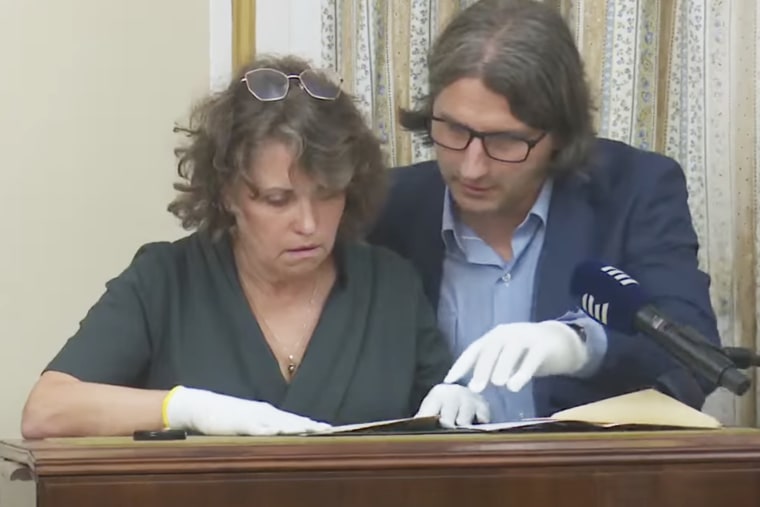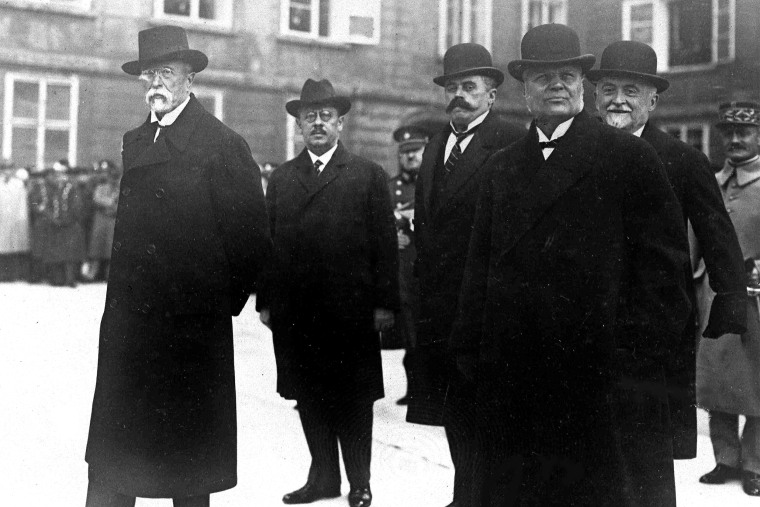“It is the end, but I’m not afraid.”
That's the message delivered Friday to a nation on tenterhooks, sealed for nearly a century inside an envelope thought to carry its founding father's final words.
The words of Tomáš Garrigue Masaryk — the first president of an independent Czechoslovakia, which has since split into Czechia and Slovakia — were unveiled in a live broadcast attended by current Czech President Petr Pavel.
Speculation had gone into overdrive prior to the announcement, with experts wondering whether Masaryk may have conveyed a fateful warning before Europe's descent back into war. His words are believed to have been dictated to his son Jan, surviving both World War II and subsequent communist rule.
 The letter being read for the first time at an event in Lány, Czech Republic, on Friday.Český rozhlas Radiožurnál / via YouTube
The letter being read for the first time at an event in Lány, Czech Republic, on Friday.Český rozhlas Radiožurnál / via YouTubeJan’s former secretary handed the envelope to the National Archives in 2005 on the condition that it not be opened for another 20 years.
Even the Masaryk family did not know what mystery the white envelope contained. But when it was opened early Friday, it still managed to surprise.
Inside was another yellow envelope, containing five pages of handwritten notes in Czech and English (Masaryk's wife, Charlotte Garrigue, was born in the United States.)
Rather than a final message before his death in 1937, experts assessed that the message was instead dictated three years earlier.
“I am ill, seriously ill — it is the end, but I am not afraid. You will continue the work, you know how, but you must be careful. You know how to behave; I don’t need to tell you anything more,” the letter read, according to the country's official broadcaster.
At the time, Masaryk was gravely ill after a stroke, and those around him thought his days were numbered.
 Masaryk, left, and Prime Minister Antonin Svehla, right, in Prague in November 1927.AP file
Masaryk, left, and Prime Minister Antonin Svehla, right, in Prague in November 1927.AP fileMasaryk became the first president of Czechoslovakia in 1918 after it declared independence from the Austro-Hungarian Empire, which was defeated in World War I. He served until 1935. Jan became foreign minister at the end of World War II, until his sudden death in 1948.
In the envelope, Masaryk talked extensively about his death and subsequent funeral and reflected on the complex political situation in the ethnically diverse country.
As well as derisive comments about a Slovak politician, he urged keeping the German minority part of the state. “Give them what they deserve, but no more,” he said of the Germans, according to the state broadcaster.
“[This was a] crucial time in Czechoslovakia with Hitler just coming to power in Germany,” said Mark Cornwall, an emeritus professor of modern European history at the University of Southampton in England.
“It was a very turbulent period in Europe about what was going to happen,” said Cornwall, nodding to the Nazis' subsequent annexation of the Sudetenland, a Czech region that had a significant German-speaking population, and the later outbreak of World War II.
“Masaryk is still very revered” in the country, Cornwall told NBC News in a telephone interview. “I can’t think of an American equivalent. Perhaps he’s George Washington or Abraham Lincoln.”
Jay Ganglani is NBC News's 2025-26 Asia Desk Fellow. Previously he was an NBC News Asia Desk intern and a Hong Kong-based freelance journalist who has contributed to news publications such as CNN, Fortune and the South China Morning Post.
The Associated Press
contributed
.
.png)




